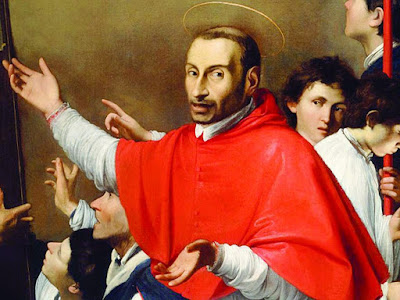SEPTEMBER 1, 2019
7:30 AM, 9:00 AM, 10:30 AM (SUN) ORDINARY FORM MASSES

Extending forty miles – from the south side of the Swiss Alps and dividing the Italian regions of Lombardy and Piedmont, Lago Maggiore, literally the “Greater Lake” is the second largest lake in Italy and the largest lake in Switzerland. In the western arm of the lake there are three small islands which were acquired by the Borromeo family in the 16th century, and are still owned by their descendants to this day.
The family motto, Humilitas, is Latin for “Humility.”
Perhaps the most famous, and most humble, member of the Borromeo family was Saint Charles Borromeo – whose feast day is coming up on November 4 – and who was the Cardinal Archbishop of Milan in the 16th century, as well as a leading figure in the Counter-Reformation.
Yet it is a not-so-subtle irony to see the family motto (“Humility”) spelled out in enormous letters in gardens, across lawns, and even as topiary hedges.
I suppose it’s hard to be humble when your family motto can be photographed from space – you can find it on Google Earth … bigger than life … on Isola Bella – the “Beautiful Island” – spelled out in flowers on one of the expansive lawns.
The island is, indeed, quite beautiful … whether or not the immense Lombard Baroque Palazzo – whose construction began in 1632 – and which contains countless ballrooms, chandeliers, tapestries, and balconies – can truly stake any claim on humility. Perhaps that all depends on just what you mean by “humility.”
Today is the 22nd Sunday in Ordinary Time.
Our readings this morning revolve around a theme of Humility.
And while Humility may be difficult to find in a dazzling palace garden on your private island; it also has very little – actually nothing – to do with being a door mat.
Rather, Humility is the moral virtue – that is, the practice – that allows a person to remain within their proper and appropriate boundaries. Calling us to an ordered love of self; while still recognizing our total dependence on God, as well as our equal dignity with each other. Humility also opposes an immoderate abasement of one’s own self or one’s own abilities.
St. Benedict, who lived in the 6th century – 1,000 years before St. Charles Borromeo – has an entire chapter in his Rule dedicated to humility … often called “The Ladder of Humility” or perhaps it could be called Benedict’s 12 Steps to Humility.
An exhaustive exploration of the 12 rungs or steps of Humility is perhaps outside of the boundaries of a Sunday Homily.
I do recommend the contemporary treatment of this subject in an easy-to-read book titled: Humility Rules by Benedictine Father J. Augustine Wetta.
Nonetheless, to summarize briefly, the twelve steps are:
- Fear of the Lord
- Self-denial
- Obedience
- Perseverance
- Repentance
- Serenity
- Self-abasement
- Prudence
- Silence
- Dignity
- Discretion
- Reverence
Keeping in mind that all of these are to be balanced and none are to be taken to excess. They are meant to define our boundaries with God and neighbor.
At its most basic, Humility is opposed to Pride. But it also opposed to Immoderation.
As we approach this altar to receive the Sacred Body and Blood, Soul and Divinity of Jesus Christ, let us pray for the grace to grow in the virtue of Humility – that we might not fall into sinful Pride, but rather know and maintain our spiritual and human boundaries and live them with balance and moderation.






























